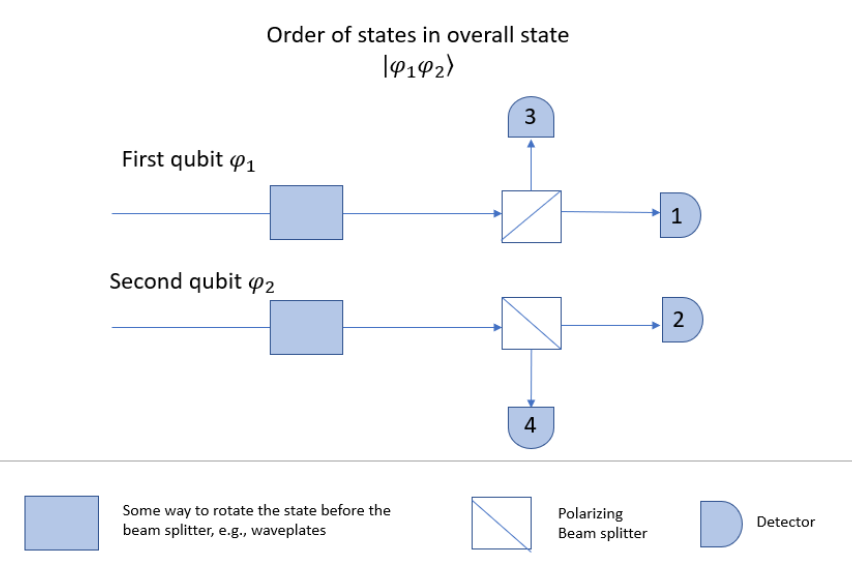Table of Contents
- State Tomography
- Error Corrections
- Examples
Example : 2 Qubits and 4 Detectors
In this example we perform tomography on a 2-qubit state using 4 detectors. The following is a representation of the lab setup. Using this setup we can perform a series of measurements and receive coincidence counts between the detectors.

In the following python example we collected data on the Bell state HH+VV. The detector pair order is stated to the right.
- Det-pair 1 : 1-2
- Det-pair 2 : 1-4
- Det-pair 3 : 3-2
- Det-pair 4 : 3-4
Python Code
import QuantumTomography as qLib
import numpy as np
# Coincidence counts for 9 measurements.
# Each row is the coincidence counts for detector pairs 1,2,3 and 4 respectfully
coincidence_counts = np.array([[497, 0, 0, 503],
[256, 265, 250, 229],
[235, 268, 242, 255],
[254, 262, 249, 235],
[521, 0, 0, 479],
[235, 268, 248, 249],
[265, 229, 280, 226],
[253, 242, 247, 258],
[ 0, 495, 505, 0]])
# Measurement basis for 9 measurements
# In each row the first two (possible complex) numbers alpha and beta represent the state that the first qubit
# is projected onto when it ends up at detector 1.
# The next two numbers is the state the second qubit is projected onto when it ends up at detector 2.
measurements = np.array([[1+0j, 0j, 1+0j, 0j],
[1+0j, 0j, 0.70710678+0j, 0.7071067811865476+0j],
[1+0j, 0j, 0.70710678+0j, 0.70710678j],
[0.70710678+0j, 0.70710678+0j, 1+0j,0j],
[0.70710678+0j, 0.70710678+0j, 0.70710678+0j, 0.70710678+0j],
[0.70710678+0j, 0.70710678+0j, 0.70710678+0j, 0.70710678j],
[0.70710678+0j, 0.70710678j, 1+0j, 0j],
[0.70710678+0j, 0.70710678j, 0.70710678+0j, 0.70710678+0j],
[0.70710678+0j, 0.70710678j, 0.70710678+0j, 0.7071067811865476j],])
# Initiate tomography object
tomo_obj = qLib.Tomography()
# Run tomography
[rho_approx,intensity,fval] = tomo_obj.StateTomography(measurements,coincidence_counts)
# Print Results
tomo_obj.printLastOutput()
print('----------------')
bell_state = 1/np.sqrt(2) * np.array([1,0,0,1],dtype=complex)
print('Fidelity with actual : ' + str(qLib.fidelity(bell_state,rho_approx)))
Output:
State:
0.512 3.42e-03+i5.99e-03 5.10e-03+i1.63e-03 0.499+i1.98e-03
3.42e-03-i5.99e-03 9.31e-05 5.32e-05-i4.88e-05 3.36e-03-i5.83e-03
5.10e-03-i1.63e-03 5.32e-05+i4.88e-05 5.61e-05 4.98e-03-i1.57e-03
0.499-i1.98e-03 3.36e-03+i5.83e-03 4.98e-03+i1.57e-03 0.487
intensity : 1.0
fval : 8.99e+06
concurrence : 0.999
tangle : 0.999
entropy : 1.84e-06
linear_entropy : 1.42e-07
negativity : 0.999
purity : 0.999
----------------
Fidelity with actual : 0.9996890733603662